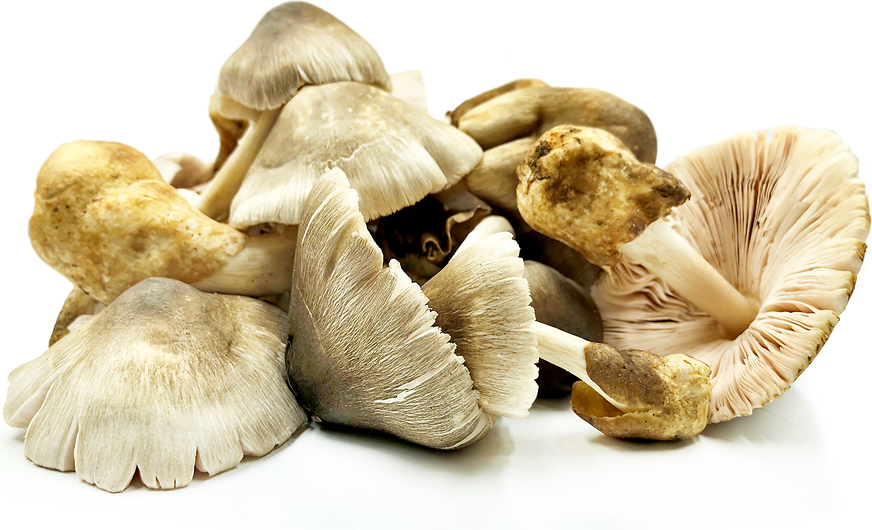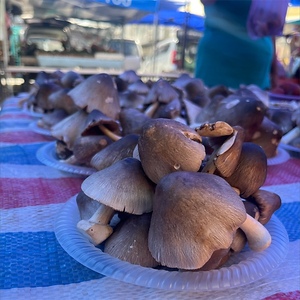


Kulat Sawit Mushrooms
Estimated Inventory, lb : 0
Description/Taste
Kulat Sawit mushrooms are small to medium in size with round, convex, pointed, to broad and flat caps that can be open or closed, depending on maturity. The caps of the mushrooms are smooth, thick, range in color from cream-colored, grey, to brown, and the edges of the cap can be wavy or split due to moisture content. Underneath the cap, individual to the specific variety, the ivory gills are compact, free, and stand above a thin, off-white stem. Kulat Sawit mushrooms are tender and slightly chewy with a mild and light earthy flavor.
Seasons/Availability
Kulat Sawit mushrooms are available year-round.
Current Facts
Kulat Sawit mushrooms belong to the Fungi kingdom and are grown from used oil palm tree bunches. Also known as the Oil Palm mushroom, Palm Kernel mushroom, Cendawan, and Kelad Sawit, many different varieties of mushrooms fall under the Kulat Sawit name. Malaysian locals use Kulat Sawit as a general term to describe the mushrooms that are harvested off of the oil palm’s empty fruit bunches. These bunches are gathered, dampened, and then covered. After a week has passed, farmers begin checking for mushroom growth and then harvest as the mushrooms reach the desired maturity. Kulat Sawit mushrooms are a Malaysian local favorite for stir-fries and soups and are difficult to find outside of roadside farm stands and markets in Southwest Asia.
Nutritional Value
Kulat Sawit mushrooms contain some dietary fiber, protein, potassium, zinc, and iron.
Applications
Kulat Sawit mushrooms are best suited for cooked applications such as boiling, frying, and sautéing. They are commonly cooked with hot chilies and served with rice or noodles, or they are lightly sautéed with other vegetables and served as a side dish. They can also be sliced or chopped and added to curry-based dishes, hot pot, stir-fries, and into soups. Kulat Sawit mushrooms pair well with seafood such as fish, shrimp, and squid, meats such as chicken and beef, aromatics such as ginger, garlic, and onion, soy sauce, oyster sauce, and basil. They will keep for a couple of days when stored unwashed in a paper or well-ventilated bag in the refrigerator.
Ethnic/Cultural Info
Malaysia is one of the largest exporters of palm oil in the world, but with increased production comes an excess of oil palm waste. One oil palm plantation can produce over 150 tons of oil palm empty fruit bunches in one day. To reduce waste, Malaysian farmers have now turned to composting the used bunches and growing mushrooms on the compost. This project has not only reduced the toxic waste from the original method of burning the bunches, but it also provides farmers with a secondary source of income.
Geography/History
Kulat Sawit mushrooms are native to Southeast Asia and are grown in palm oil production regions including Sarawak and Sabah in Borneo and West Malaysia. Today, Kulat Sawit mushrooms can be found in local markets and at roadside stands in Malaysia and select areas of Southeast Asia.
Podcast









